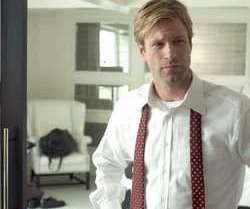Antiheroes in “Thank You for Smoking”

I just saw a delightful movie: Thank You for Smoking. It was funny in an unusual way. It made us laugh at completely reprehensible characters without breaking empathy. There was, I think, not a single character in the story who was not morally flawed to an extreme degree. They were all antiheroes – especially the protagonist, the guy who would normally be considered the hero. He was the world’s biggest tobacco lobbyist, a guy with stupendous talent with deceptive rhetoric.
The whole story was a funny exposé of the logical convolutions involved in justifying the tobacco business – as the support of “free choice.” The film was brilliant, and at the same time its moral message came across. Nick, the lobbyist, (see photo) gave the best arguments possible to justify big tobacco, engaging in pluralistic debates, sometimes against his naïve young son, sometimes against a morally outraged senator. One might have worried that his smooth reasoning might actually sway unsophisticated members of the audience, but actually, that outcome was never a possibility.
Most plays with messages can be divided into two categories: first, those that are heavy-handed, displaying the wrong-headed characters as villains who must be destroyed in the end, or, second, those portraying the antagonist dismissively as ridiculous, laughable. Either way, the audience knows better than to empathize with them. I personally dislike films of the second type, when I am supposed to enjoying feeling superior to a subnormal character’s folly. Slapstick, for example, is of that type. I cannot laugh at people for whom I have contempt. On the other hand, a hero who is too perfect is not interesting either.
The remarkable thing about Thank You for Smoking was that Nick’s flaws are exaggerated, yet we like him. We admire his intelligence, and even identify with him as he exercises his “moral flexibility,” as he describes himself. He’s a perfect anti-hero.
Antiheroes can be great moral instructors. We learn to be less judgmental and rigid from caring about them, even though we know they are wrong. Fortunately, Nick did not fool himself, even when he was consciously trying to fool everyone else. He knew how many people were dying as a result of tobacco. In fact, he met regularly for lunch with two other lobbyists, the self-styled “Merchants of Death,” who promoted liquor and guns, and he boasted that his particular job killed vastly more people per year than theirs did. Nor did he seem to have any inner qualms. His debating skill was a sport and, when he justified playing at it, he merely said that it was “paying the mortgage.” In no way do we let Nick off the hook for his sleazy deeds – yet we like him and wish him well. We can laugh at him in a friendly way, seeing our own comparable manipulativeness mirrored in his actions. I am Nick sometimes, and so I can forgive him and enjoy him, even when he is wrong. You are Nick sometimes too. Antiheroes are mirrors that reveal our own not-so-great qualities, yet with a light enough touch to allow us to feel affection for them.
There were jokes elsewhere in the film, yet I didn’t laugh at Nick much. I smiled at him, with affection, as I might smile at my own foibles. Eventually he takes a principled step, thank goodness, by quitting his job as tobacco lobbyist. There’s a moment of redemption for him – but only a moment. In his next job, he is training other lobbyists in the evasion of scientific evidence about a new public health risk: cell phones.
This is the kind of film I want to see more of. It has a message that definitely gets across; nobody will take up smoking because of it and probably lots of people will quit. Yet it allows us to feel good, to extend our empathy beyond our normal everyday limits. It gives us laughter, affection, and a number of peptides that are good for our health and good for our society. Hooray for this film! This kind of movie, if executed well and often, can save our world – one social problem at a time.



2 Comments:
Good review ... I loved this one too .. it's very smart and very funny
Thanks Ted. But I got a bit of a jolt a day or two after I'd posted this. I was driving in the car, listening to two talk-show hosts bantering. The woman referred with APPROVAL to the line of Nicks saying this is a matter of freedom. Everyone knows that tobacco is harmful and if people choose to smoke anyhow, that's their "right."
I was astonishing to hear someone buy this argument. In the blog I had claimed that no one would possibly accept it, but she did. What they needed to have said too was that it's addictive. When you're addicted to something, you lose your choice. Addiction is not freedom. Nick knows that damn well. I hope his son does too.
Post a Comment
<< Home